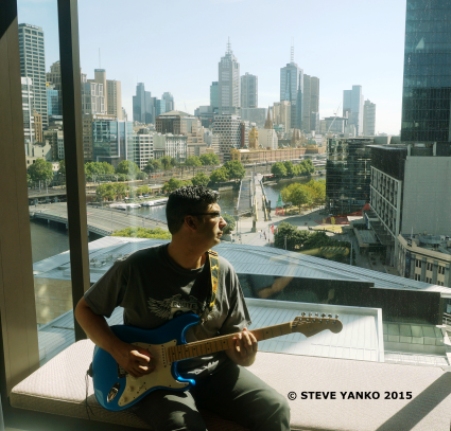When I started learning how to play the guitar I was around 7 years old. People would say “practice makes perfect”. You would hear that cliché at school, in the movies and on TV but as a music teacher I’m telling you that “practice does NOT make perfect”. The cliché of “practice makes perfect” should be changed to “good practice makes perfect” or “organised practice makes perfect”.
In today’s society parents and their children have busy lives. School, homework, sports, tutors, play dates etc. take up a lot of time. Therefore in order for a child beginning their musical journey to progress consistently they need to apply the correct strategies when practicing. The following tips will help parents and their children manage their practice routine.
1 CHOOSE THE RIGHT TIME FOR PRACTICE
Some children work really well in the morning and others work better in the afternoon or evening. If a student wants to practice in the morning, then great. If a student prefers to practice in the afternoon or evening then that is great too. As long as the student is practicing at a time that they feel happy and productive and doesn’t disrupt the rest of the family then they will progress quite easily.
2 THE DURATION OF THE PRACTICE SESSION
The advice I give to parents of children between the ages of 6 – 12 years old is for the child to practice for at LEAST 15 minutes for at LEAST 3 – 4 times a week. As the child gets older and more experienced with their musical instrument they will naturally practice for longer periods of time and they will be able to cope better with longer practice sessions.
I know that when I was a child I had to practice for at least 30 minutes around 5 times a week. At that young age I used to feel tired after a practice session and frankly could not see the benefit of practicing until I was a little older and more experienced as a music student. As I matured, I could see and feel that the more I practiced the better I became as a musician and this only made me want to practice more.
In today’s age, children have too many distractions (TV, internet, computer and console games etc.) and generally focus on things for short periods of time. Therefore they will benefit more by having a short practice session than practicing for hours. Simply practicing for hours upon hours does not guarantee perfection, especially if you practice incorrectly. Here is a simple example. One student studies the whole week that 1 + 1 = 3. Another student studies 10 minutes before the test that 1 + 1 = 2. Which student will pass the test? The student who studied for many hours the wrong information or the student who studied the right information for a short period of time? Obviously, studying or practicing correctly will reap better results regardless of the time invested.
In addition, by practicing regularly and in shorter sessions throughout the week, a student will consolidate their knowledge of the music theory taught and their practical skills will continue to improve. Music students need to build their strength and stamina and therefore regular practice sessions are beneficial compared to having 1 long practice session. There is no long term benefit to a student by cramming in hours of practice the day before a music lesson. Learning a musical instrument is a task that takes time, patience, perseverance and it requires REGULAR practice.
3 SET A TIMETABLE
Over the 25 years I have taught, I have found that students with a regular routine of practice based on a timetable always do well in their music studies.
Parents should sit down with their child and write down the times, days etc. the child can practice. It is important the the child nominates the times that they intend to practice as they will have a sense of ownership and accountability for their practice.
When creating the timetable, choose times when the student won’t be tired. Choose times that will not give the student an excuse not to practice. For instance, don’t nominate a time to practice when their favourite TV show is on. Choose times that factor in the student’s homework load, sports activities and family activities. When you take into consideration all of the weekly activities you will find 15 – 20 minutes for the student to practice….7 days a week.
4 WHERE TO PRACTICE
For some students knowing where to practice is obvious. For example, a piano student will practice wherever the piano or keyboard is located. However, a guitar student can practice (or hide) wherever they want. I am of the belief that a beginner student, if possible, should practice near their parents. For instance, while parents are preparing dinner a student can practice near them so that the parents can see and hear what they are doing. If this arrangement is not suitable then the student can practice in their bedroom or lounge room etc. but the parent can sit with their child while they practice.
For many beginner students having a parent around when they practice shows the student that their effort in a practice session is important and recognised. It also encourages the student to do better. After all what child doesn’t want to impress their parents?

5 WHAT TO PRACTICE
Your child’s music teacher would have assigned tasks for them to practice over the week. These tasks could be technical exercises (such as scales, sight reading etc.), music theory homework and songs. Inevitably, once a student knows how to play songs that is all they want to practice. However, students need to understand that if they do the technical exercises their skill level will improve, their knowledge will increase and they will be able to play more songs in a variety of genres and complexity.
In a practice session, students should take their time to understand what is required of them. For instance in my lessons I teach my students the following:
1 Read the Music
At this stage the student analyses the music theory. For instance, what is the time and key signature of the music, what are the notes that need to be played, what are the rhythmic patterns of the piece etc.?
2 Find the Notes
At this stage the student plays their instrument without keeping a beat or playing the notes according to note values. Instead, the student simply works out where to physically play notes on the instrument.
3 Play the Music
Finally the student combines their theoretical and practical knowledge to play the music written before them.
6 THE ROLE OF PARENTS
Remind Your Child to Practice
Over the years, parents of my students will complain and say “I always have to tell “Insert name of child” to practice” and I always respond by saying “that’s right…that’s what YOU should do”. The parent will usually respond by saying “but they want to learn, shouldn’t they go and practice for themselves?”. Now that is correct but what I have found is that many young children don’t see the connection between practicing and getting good results. Therefore, it’s our job as teachers and parents to tell children to go and practice and to explain the benefits of practice.
Children have a different view of the world compared to adults. Recently, one of my students who is always engaged in his music lessons told me that he didn’t practice at home because “school is for work and home is for resting”. For my student, his lack of practice at home was justified because “home is for resting”. This is the honest view of an 8 year old child. Therefore it is imperative for parents to remind their children to practice and to explain why good and regular practice is important.
Use Positive Words
It is very important that parents recognise their children’s efforts when they practice. Phrases such as “Well done” and “great effort” make children feel good and lets them know that their parent values what they are doing. More importantly, if what the child is playing sounds good then tell them that it sounds good. Positive words will only give the child incentive to practice more.
Don’t Worry About Mistakes
If a child is struggling during a practice session and is making mistakes….don’t worry. Making mistakes is part of the process of learning a musical instrument. Mistakes are an integral part of a practice session. A student should never be reprimanded for making mistakes when they practice. Instead they should be reminded to focus, take their time and to keep trying. Explain to the child that if they they practice correctly and regularly that they will reduce the number of mistakes they make. Every successful musician has made mistakes. Making mistakes and learning from them is part of every musician’s musical journey.
Business Before Pleasure
Life is very complicated and so here is how you, the parent, can simplify the practice routine at home. Don’t let your child play computer games, watch TV etc. unless they have completed their homework and music practice. In other words, apply the “business before pleasure” principle. Establish the work priorities in your household. Music practice is not a punishment but you, the parent, are paying for the lessons. How do you think your child will progress without practice? Simply, they won’t. Are you prepared to waste your money on music lessons? If not, apply the “Business before pleasure” principle and make sure your child practices before they spend hours playing on their IPad or computer games. Trust me, this approach works.
So there you have it. A few simple ideas to ensure that your child practices correctly and regularly. As a former music student and now music teacher, I can tell you from my own experience that “good and organised practice makes perfect” and more importantly a positive approach to practice will enable a student to progress quickly and to fully enjoy playing their musical instrument.
BY STEVE YANKO
© STEVE YANKO 2017
